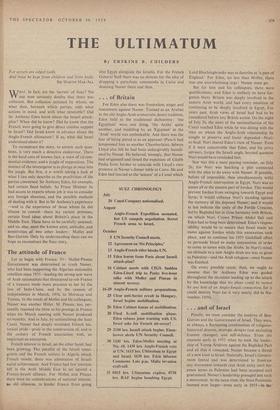The attitude of France
Let us begin with France. Th^ Mollet-Pineau Government was determined to crush Nasser, who had been supporting the Algerian nationalist rebellion since 1955—leading the strong new wave of Arab nationalism that threatened to rob France of a treasure made more precious to her by the loss of Indo-China, and by the cession of independence in March, 1956, to Morocco and Tunisia. In the minds of Mollet and his colleagues, Nasser was another Hitler. M. Pineau, too, per- sonally resented the blow to his prestige in France when his March meeting with Nasser produced no benefits. And in July, by nationalising the Suez Canal, Nasser had deeply wounded French his- torical pride—pride in the construction of, and in the century of French association with, so important an enterprise.
French interest in Israel, on the other hand, had been growing. The parallel of the Israeli immi- grants and the French settlers in Algeria struck French minds; there was admiration of Israeli social achievement. And France had few interests left in the Arab Middle East to set against a Franco-Israeli alliance. For Monet and Pineau there were no considerations of national interest, no old alliances, to hinder France from going into Egypt alongside the Israelis. For the French General Staff there was no distaste for the idea of dropping a parachute commando in Cairo and shooting Nasser there and then.










































 Previous page
Previous page